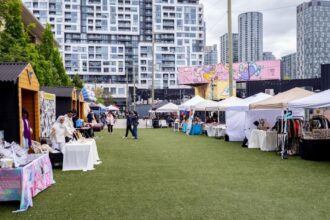The hum of conversation mingling with music, ice clinking in glasses, and the unmistakable scent of sunscreen in the air—summer party season has arrived in Canada with all its glory. As Ottawans emerge from their winter hibernation eager to celebrate the warmer months, there’s a collective excitement that’s almost palpable in the air. But amid the enthusiasm, safety considerations often take a reluctant backseat to spontaneity and fun.
“Every summer, we see the same patterns,” says Ottawa paramedic Sarah Johnston. “Calls spike dramatically during weekend evenings, with many incidents entirely preventable with just a bit of planning.” Johnston’s observations reflect a broader reality across Canadian cities, where emergency services consistently report increased activity during summer festivities.
The appeal of summer gatherings is undeniable—they represent a cultural touchstone in our weather-conscious country. They’re where memories are made, relationships forged, and the simple pleasure of being outdoors is celebrated. But this season of joy shouldn’t come with unnecessary risks.
Ottawa Public Health has launched their annual “Party Safer” campaign, emphasizing that responsible celebration doesn’t diminish enjoyment—it enhances it. Their approach focuses on practical steps rather than prohibition, acknowledging that people will party regardless of warnings.
Hydration stands as the cornerstone of party safety, particularly as climate change drives increasingly unpredictable heat waves across Canada. “We’re seeing temperatures that would have been rare a decade ago,” notes climatologist Dr. Rahim Mehta. “Alternating between alcoholic beverages and water isn’t just good advice—it’s increasingly essential.” The recommendation: one glass of water for every alcoholic drink consumed, with extra attention during peak afternoon heat.
Food safety, while less glamorous than other considerations, presents significant risks when overlooked. The “danger zone” for perishable foods—between 4°C and 60°C—becomes particularly treacherous during outdoor summer events. Ottawa’s public health guidelines suggest keeping cold foods on ice and hot foods properly heated, with nothing left at ambient temperature for more than two hours (one hour on particularly hot days).
The post-pandemic social landscape has added nuanced dimensions to party safety. “There’s been a noticeable shift in how people approach gatherings,” observes sociologist Dr. Claudia Lamont from the University of Ottawa. “There’s heightened awareness about personal space and hygiene, but paradoxically, there’s also this intense desire for connection that sometimes overrides caution.” This tension creates new safety considerations that weren’t part of our collective consciousness before 2020.
Transportation planning remains a persistent challenge for party-goers. Despite decades of public education, impaired driving incidents still surge during summer months. Ottawa Police Services’ summer checkpoints regularly intercept drivers who “just had a couple” but are legally impaired. The proliferation of rideshare services and improved public transportation has helped, but advance planning remains crucial.
For hosts, liability concerns add another layer of responsibility. “Many people don’t realize that hosting a party comes with legal obligations,” explains Ottawa-based lawyer Michael Chen. “If someone leaves your party intoxicated and causes harm, you could potentially share liability under certain circumstances.” Chen recommends hosts familiarize themselves with “social host liability” concepts and take reasonable steps to ensure guests have safe transportation options.
The digital dimension of party safety has evolved rapidly, with considerations around social media and online privacy becoming increasingly important. “The reflexive sharing of party locations, attendees, and activities can create unexpected vulnerabilities,” warns cybersecurity expert Aisha Patel. Her advice is straightforward: “Be mindful of what and when you share. Consider waiting until after the event to post photos or videos, and be respectful of others who might not want their presence documented.”
When I spoke with longtime Ottawa resident and legendary host Carmen Rodriguez, she offered wisdom gained from decades of successful summer gatherings: “The best parties are the ones where everyone feels taken care of—whether they realize it or not. That’s the art of hosting.”
As we embrace the joy of summer celebrations across Canada, perhaps that’s the perspective worth adopting. Safety measures aren’t restrictions that diminish our enjoyment but rather the foundation that allows us to fully embrace these precious moments of connection. After all, the best summer memories are the ones we can remember clearly the next morning—and for years to come.
How will you be incorporating safety into your summer celebrations this year? The choices we make not only protect ourselves but contribute to a culture of responsible enjoyment that enhances rather than restricts our collective summer experience.
For more insights on Canadian cultural trends, visit CO24 Culture or explore emerging social patterns at CO24 Trends.
























